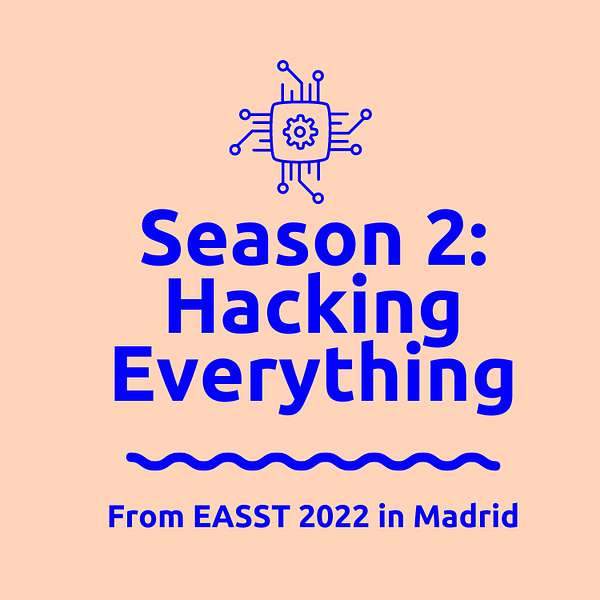
Hacker Cultures: The Conference Podcast
As Covid-19 turned most conferences virtual, so to combat Zoom-fatigue, at 4S/EASST 2020 we decided to try another format and turn a conference session into a podcast. Among hundreds of panels, papers and sessions, our panels rounded up all sorts of researchers who study what it is to be a hacker, and what hacking, programming, tinkering and working with computers is all about. We have continued biennally for full three seasons.
The newest season comes to you from the 2024 join Society for Social Studies of Science/European Association for the Study of Science and Technology conference (4S/EASST) in Amsterdam, titled "Making and Doing Transformations".
The second series was from EASST 2022 titled "The Politics of Technoscientific Futures" held in Madrid in July 2022. Our panel was titled "Hacking Everything. The cultures and politics of hackers and software workers". The first series was from 4S/EASST in "virtual Prague" in August 2020, titled "Locating and Timing Matters: Significance and agency of STS in emerging worlds".
We the hosts are Paula Bialski, who is an Associate Professor at the University of St. Gallen, Andreas Bischof who is a Research Group Leader at Chemnitz University of Technology, and Mace Ojala, a PhD scholar at Ruhr-University Bochum. Audio production by Heights Beats at Hotmilk Records. The theme track of first series is "Rocky" by Paula & Karol. Heights Beats produced the theme track of the second series. Funding for the editing of this first series comes from University of St. Gallen, the second from Chemnitz University of Technology.
Hacker Cultures: The Conference Podcast
Episode 3 (2022) Tim Cowlishaw - Tiny tools and little loops. Software art as care-ful software practice
We speak with Tim Cowlishaw, BAU, Doctoral Candidate at College of Arts & Design Barcelona.
Whether as part of giant technology corporations or open-source software projects, software developers are increasingly responsible for defining, building, and maintaining the infrastructure of our social world, and much critical and anthropological attention has been paid to the ways in which the cultures and practices of software development influence the materiality and embedded politics of these infrastructures. However, less critical attention has been paid to software development deployed to less instrumental ends, in particular, creative and artistic practices that use software as a medium. We claim, building on Nick Seaver (2021)s work on care and scale as contrasting values in the development of software systems, that paying attention to such personal, creative software practices provides a valuable opportunity for a deepened understanding of cultures of software development in general, by articulating and making visible the differences between the development of aesthetic and instrumental software objects - a distinction which is elided when software development is studied in more general undifferentiated terms. In addition, we argue that software art and the creative practice of software development offer a useful means of interrogating the ontology of software and digital artefacts, arguing that such practices are a form of ontological designing (Willis 2006) producing digital objects (Hui 2016) which serve to expose the ontology and embedded politics of software artefacts and systems more generally. Finally, we argue that such creative practices constitute a care-ful (Puig de la Bellacasa 2017) approach to software development, building on the Critical Technical Practice of Philip Agre (1997), offering one example of how critical and ethical considerations might be usefully incorporated into professional software development practices.
This episode is a live recording from Hacking Everything. The Cultures and Politics of Hackers and Software Workers panel organized at the European Association for the study of Science and Technology (EASST) 2022 conference in Madrid on 2022-07-07. The hosts are Paula Bialski, Andreas Bischof and Mace Ojala. Audio production by Heights Beats at Hotmilk Records, who also produced the theme track. We are grateful for Chemnitz University of Technology for funding.